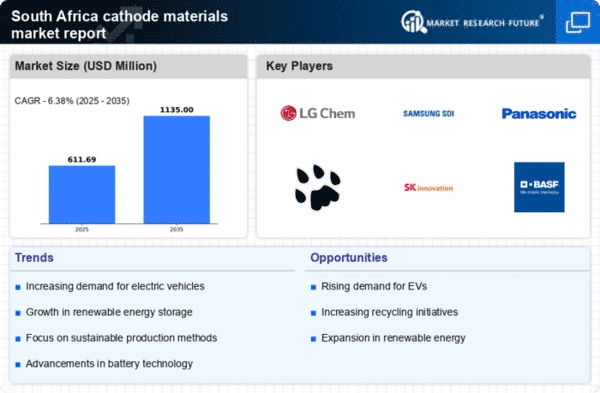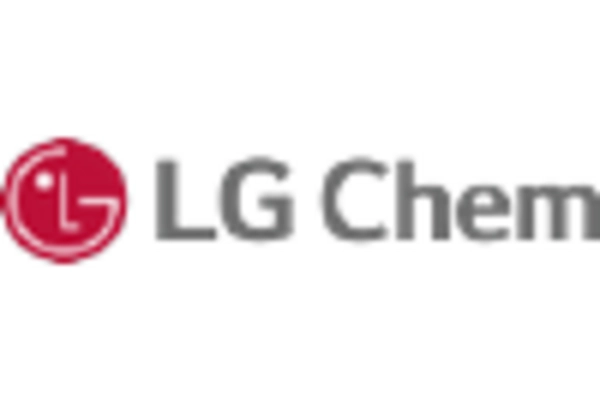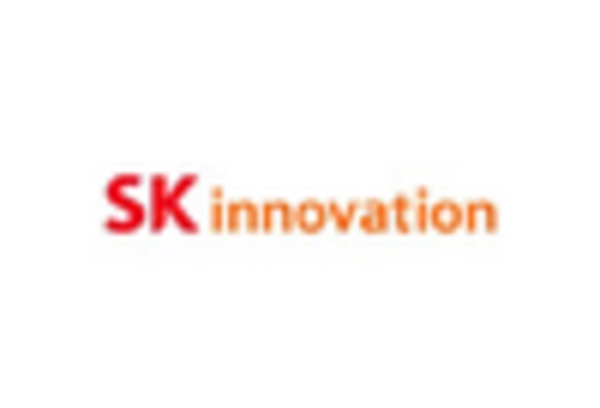Growing Demand for Electric Vehicles
The increasing adoption of electric vehicles (EVs) in South Africa is driving the cathode materials market. As consumers and businesses seek sustainable transportation options, the demand for high-performance batteries is surging. In 2025, the EV market in South Africa is projected to grow by approximately 30%, necessitating advanced cathode materials to enhance battery efficiency and longevity. This trend is likely to stimulate investments in local production facilities for cathode materials, thereby boosting the overall industry. Furthermore, the South African government is promoting EV adoption through incentives, which may further elevate the demand for cathode materials. As a result, manufacturers are focusing on developing innovative materials that can meet the specific requirements of the burgeoning EV sector.
Increased Focus on Renewable Energy Sources
The shift towards renewable energy sources in South Africa is creating a favorable environment for the cathode materials market. As the country aims to reduce its carbon footprint, there is a growing emphasis on energy storage systems that utilize advanced battery technologies. The integration of solar and wind energy into the national grid necessitates efficient energy storage solutions, which rely heavily on high-quality cathode materials. By 2025, the demand for energy storage systems is expected to rise by 40%, driven by government initiatives and private sector investments. This trend suggests that manufacturers of cathode materials may experience heightened demand as they cater to the needs of the renewable energy sector, thereby enhancing their market position.
Rising Environmental Regulations and Standards
The implementation of stringent environmental regulations in South Africa is influencing the cathode materials market. As the government enforces stricter standards for battery production and disposal, manufacturers are compelled to adopt sustainable practices. This shift is likely to drive innovation in the development of eco-friendly cathode materials, which could lead to a 15% increase in demand for such products by 2025. Companies that proactively align their operations with these regulations may gain a competitive edge in the market. Furthermore, the emphasis on sustainability may attract investments from environmentally conscious consumers and businesses, thereby enhancing the overall growth potential of the cathode materials market.
Technological Advancements in Battery Chemistry
Innovations in battery chemistry are significantly impacting the cathode materials market. Research institutions and companies in South Africa are exploring new materials, such as lithium iron phosphate (LiFePO4) and nickel-cobalt-manganese (NCM) composites, which offer improved energy density and safety. The introduction of these advanced materials is expected to enhance battery performance, making them more appealing for various applications, including renewable energy storage. In 2025, the market for advanced battery technologies is anticipated to expand by 25%, driven by the need for efficient energy storage solutions. This growth indicates a robust opportunity for cathode materials manufacturers to align their products with the evolving technological landscape, thereby positioning themselves favorably within the industry.
Government Initiatives Supporting Local Manufacturing
The South African government is actively promoting local manufacturing of cathode materials to reduce dependency on imports. This initiative is part of a broader strategy to enhance the country's industrial capabilities and create jobs. In 2025, government policies are expected to incentivize investments in local production facilities, which could lead to a 20% increase in domestic cathode materials output. Such initiatives may also encourage collaboration between local manufacturers and international technology providers, fostering innovation within the industry. As a result, the cathode materials market is likely to benefit from improved supply chain efficiencies and reduced costs, positioning local players competitively in both domestic and international markets.

















